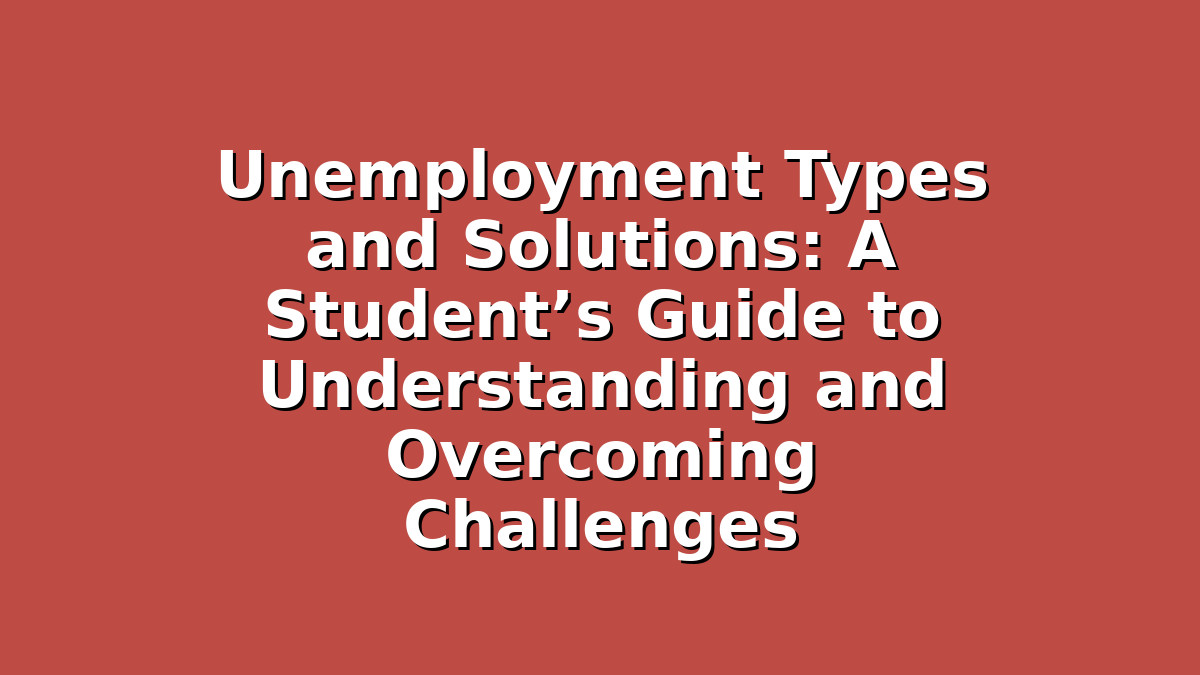Preparing for exams or managing your studies can sometimes feel overwhelming, especially when you start thinking about the future—your career, job prospects, and financial independence. One key topic that often comes up in social studies, economics, or current affairs is unemployment. Understanding unemployment types and their solutions can not only help you in your exams but also prepare you for real-life challenges ahead. In this guide, we’ll explore the different types of unemployment, relate them to student life, and offer practical study tips to help you stay motivated and focused.
What Is Unemployment and Why Should Students Care?
Unemployment occurs when people who are willing and able to work cannot find a job. It’s a critical economic issue that affects individuals, families, and entire communities. For students, it’s important to grasp the concept because it shapes the job market you will soon enter. Moreover, understanding unemployment can improve your awareness of economic cycles and government policies, which are common topics in exam questions.
Let’s break down the main types of unemployment and discuss how you can apply these ideas to your study routine and future job search.
—
1. Frictional Unemployment: The Transition Phase
What is it?
Frictional unemployment happens when people are temporarily without work because they’re transitioning between jobs. For example, a graduate looking for their first job or someone quitting one job to find a better one might be frictionally unemployed for a short time.
Relating it to students:
Think of frictional unemployment like the time between finishing one exam and starting to study for another. It’s a natural phase of transition but can feel uncertain or stressful.
Study tips related to frictional unemployment:
– Plan Your Transitions: Just as people need time to find new jobs, you can plan breaks between study sessions strategically. Use these breaks to recharge without losing momentum. For example, after an exam, take a day or two to relax before diving into the next subject.
– Stay Organized: Create a study timetable that anticipates these ‘in-between’ periods. Having a schedule reduces anxiety and makes transitions smoother.
– Network and Seek Help: Just like job seekers benefit from networking, students can benefit from study groups or teachers’ support during these transition phases. Don’t hesitate to ask questions or discuss difficult topics.
—
2. Structural Unemployment: When Skills Don’t Match Jobs
What is it?
Structural unemployment occurs when there is a mismatch between the skills workers have and the skills jobs require. This often happens due to technological changes or shifts in the economy.
Relating it to students:
This is similar to facing a subject or topic you aren’t well-prepared for because your current skills don’t match the exam requirements. For example, if your syllabus suddenly includes new concepts or you find certain subjects harder, it can feel like a skill mismatch.
Study tips related to structural unemployment:
– Identify Skill Gaps Early: Just as workers need to update their skills, you should regularly assess your strengths and weaknesses in different subjects. Use past papers or quizzes to pinpoint areas for improvement.
– Invest in Continuous Learning: Be proactive in learning new skills. Use online resources, tutorials, or extra classes to bridge gaps. Platforms like Khan Academy, Coursera, or YouTube can be invaluable.
– Adaptability is Key: Economic changes require workers to adapt, and exams require students to be flexible. Be open to changing your study methods, trying new techniques such as mind mapping, flashcards, or group study if your old habits aren’t working.
– Seek Feedback: Just like professionals get career advice from mentors, students should get feedback from teachers or peers to understand where they need to improve.
—
3. Cyclical Unemployment: The Impact of Economic Fluctuations
What is it?
Cyclical unemployment relates to the ups and downs of the economy. In times of recession or economic slowdown, more people lose jobs because businesses hire less.
Relating it to students:
Though this might seem less directly connected to studying, economic cycles can affect your future job prospects and even your current motivation. For example, hearing about job cuts can cause anxiety about your career path.
Study tips related to cyclical unemployment:
– Focus on What You Can Control: Economic downturns are out of your hands, but your preparation isn’t. Concentrate on mastering your subjects and skills to be ready for opportunities when the economy improves.
– Build Resilience: Just as economies recover, your motivation can bounce back from setbacks like bad grades or tough exams. Practice stress management techniques such as meditation, exercise, or creative hobbies.
– Prepare for Uncertainty: Use this time to explore multiple career options rather than focusing on one path. Diversify your skills and consider internships or volunteer opportunities to build your resume.
– Stay Informed: Understanding economic trends can help you make better career choices. Follow reliable news sources or economic summaries to stay updated, which can also impress examiners in essays or discussions.
—
Conclusion: Turning Knowledge into Action
Understanding the types of unemployment—frictional, structural, and cyclical—gives you a clearer picture of the job market and the challenges you might face after graduation. More importantly, these concepts mirror challenges you encounter as a student: transitions, skill gaps, and external pressures.
By applying the study tips related to each type, you can improve your learning process and build habits that prepare you for the future. Remember, just like unemployment is a temporary phase for many, difficulties in exams and studies can be overcome with the right strategies and mindset.
Keep your goals in sight, stay proactive, and always look for ways to adapt and grow. Your hard work today will open doors tomorrow—not only through passing exams but by equipping you with the resilience and skills to succeed in any job market.
Good luck with your studies, and remember: every challenge is a stepping stone to success!
—

Responses